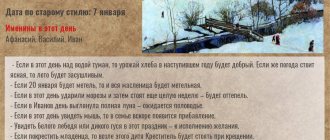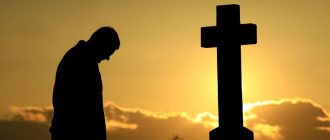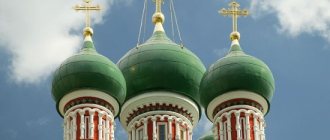The Day of Remembrance of the Great Martyr Tatiana is one of the important Orthodox holidays, which has been celebrated for more than a hundred years. Folk signs for January 25 - Tatiana's Day - often come true. For example, a snowstorm on this day promises a bad year, and frost - on the contrary.
Folk signs for January 25 - Tatiana's Day - are extremely significant for Russians. The holiday has been celebrated for more than a hundred years and has an unusual history. What is its essence and why it is called Student’s Day - in the material of Constantinople.
Initially, this Tatiana's day was exclusively a church holiday; it is associated with the veneration of the martyr Tatiana. Previously, the saint's feast day fell on January 12: according to legend, on this date she was executed by the pagans.
Tatyana lived in the 3rd century; from an early age she devoted herself entirely to serving God, but became a victim of persecution of Christians. The girl did not give in to demands to betray Christ, and for this she was killed.
Fourth Commandment
In this commandment, God calls people to work 6 days a week, but the 7th day should be devoted to serving the faith and performing holy deeds. The following are considered deeds pleasing to God:
- take care of the salvation of the soul;
- enlighten the mind and heart with religious knowledge;
- engage in godly conversations;
- help the poor;
- comfort the mourners.
The Sabbath rest was given by God to man to restore spiritual strength and perform good deeds. By eliminating daily hassles, a person is spiritually renewed and comprehends the purpose of life. Work is important in the integrity of aspirations, but the salvation of the soul is considered more important.
Twelfth Orthodox Church Holidays
They are called from the Old Church Slavonic word “twelve”, which means “twelve”. According to the laws of the Orthodox Church, these are the most significant holidays after Easter; they are dedicated to the memory of important milestones in the life of Jesus Christ and the Most Holy Theotokos on Earth. Holidays are spread out over time, which gives a person the opportunity to attend a service, remember an important event in prayer, and increase spiritual self-development. A person is always imperfect, he needs to be equal to the saints, to purify his soul.
Nativity
January 7 is a holy day, the birth of Jesus Christ. This is a day of remembrance of the Savior’s coming to people, who through his life showed how people mired in sins and illnesses can be healed. The Roman emperor sent Joseph, the husband of the Virgin Mary, to take a census in Bethlehem. They spent the night in the cave where Baby Jesus was born. The first to come to bow to the Lord were the shepherds and the wise men. Rumors about the birth of Christ reached the Jewish king Herod. He feared that the birth of Christ would undermine his power and sent soldiers to kill all the newborns in Bethlehem. The miracle warned Joseph and Mary, and they and Jesus fled to Egypt.
Epiphany
The Church calls this holiday the Epiphany of the Lord; on January 19, believers remember the waters of the Jordan River, where John the Baptist baptized Jesus Christ. The day was established as a church sacrament, now people use it to become Orthodox. Tradition says that the Holy Spirit descended from heaven to Christ like a dove, and a voice was heard from heaven: “This is My beloved Son, in whom I am well pleased” (Matthew 3:17).
Presentation of the Lord
The Old Slavonic word “meeting” is translated “meeting”. In Orthodoxy, it symbolizes the meeting of the Infant God with the representative of the Old Testament Church, Simeon, who led him into the temple to serve God. To this day, a meeting with something Old Testament means a symbol of contact with God.
Annunciation
The holiday is associated with the bringing of “good news” by Archangel Gabriel, who informed Mary that She would be the Gate, through which the Savior would come to man. He named the name of the future Son of God - Jesus. Saint Mary bowed and agreed to take on the high mission.
Palm Sunday
The holiday of the Lord's entry into Jerusalem was introduced in the 4th century; it is now called Palm Sunday. For the arrival of the Son of God in the city, the residents prepared a celebration - they covered the road with palm branches, where He rode on a small donkey, setting an example of modesty. In Russia, the palm tree was replaced with willow branches, which manage to bloom fluffy cones on calendar days; they are carried to church, consecrated, and kept at home near icons.
The consecrated willow has healing properties; people touch the branches with wishes for health, and place them at the bedside of the sick. According to the old custom, children are lashed with branches of consecrated willow, driving away illnesses from them.
Herbalists add crushed dry willow buds to medicinal decoctions to treat people. The power of willow is in healing, giving physical strength, courage, courage. They make amulets for young men and place willow buds in treasured bags.
Ascension of the Lord
The Feast of the Ascension is celebrated after the Resurrection of Christ. The risen Jesus spent 40 days telling his disciples about the Kingdom of Heaven. Then the Lord ascended into heaven, and to the surprised Apostles he said words that are now familiar: “I am with you always, until the end of the age. Amen” (Matthew 28:20). The holiday shows the fate that a person who keeps the Covenants of the Church can achieve.
The Holy Trinity
The birthday of the Orthodox Church is celebrated on the 50th day after Easter. According to Holy Tradition, the Holy Spirit appeared to the apostles, giving them the ability to preach the faith in different languages.
Transfiguration
According to legend, Jesus Christ ascended Mount Tabor with the Apostles Peter, James, and John. During their prayer, Christ’s clothes and face became bright, the prophets Moses and Elijah appeared before them and began to talk with the Lord. Jesus forbade the Apostles to talk about this until His resurrection. However, this particular incident speaks of the divine origin of Christ, which those close to him only guessed at until the end of His life on Earth.
Dormition of the Blessed Virgin Mary
The hour of Saint Mary's death has come. The apostles gathered to say goodbye to the Mother of the Savior. She was buried in the tomb where her parents and husband were buried. But in the evening She was resurrected, appeared at the dinner of the Apostles, becoming like the Son, and with them ascended into heaven.
Great Church holidays
Certain days are marked with large liturgical services. Important holidays in Orthodoxy are called great. This is indicated by their names, dates, order of performance, and content of prayers in the service. The purpose of the holidays is to remember, glorify, and understand the interpretation of the stages of Salvation embodied in the earthly life of the Savior, the Virgin Mary. This is where the importance of the Great Holidays comes from.
Circumcision of the Lord
Data about the Circumcision of the Lord comes from the 4th century. Eight days from birth, the baby Jesus, according to the requirements of the Old Testament, was circumcised, which is carried out among the Jews as a sign of God’s acceptance of the laws of the forefather Abraham. When the ritual was completed, the Son of God was left with the name Jesus, given to him by the Archangel Gabriel before His conception. The Son of God accepted circumcision, setting an example for people to obey the laws of God. He showed great humility, proved that he was a true Man, and not a bearer of ghostly flesh. Bishop Feofan
The recluse gave a modern interpretation of the meaning of the holiday: he compared circumcision with cutting off passion and lust.
Memorial Day of Basil the Great
The evening on the eve of the Feast of the Circumcision of Christ is called Vasiliev. The Slavs considered the evening generous; they took out valuable clothes and prepared food from bins. On this day, livestock went under the knife, the table was hearty and plentiful. The main dishes are roasted pig, jellied meat, fresh pancakes, kutia with milk. Donations were considered obligatory; they were taken to the temple or distributed to those in need. After the festive dinner, we went to visit our neighbors with wishes for a good life.
Nativity of John the Baptist
The holiday glorifies virtue and human service to God. Believers must understand that they are leading themselves out of darkness and leading those around them. The life of John the Baptist becomes an example to everyone of how to fulfill their earthly destiny, that a person who has been baptized carries within himself the sermons of God.
Peter's Day
A significant Christian holiday, fasting is observed before it. Before the holiday, housewives clean their homes, prepare festive dishes, and paint eggs yellow. The holiday is sanctified by the play of the sun, which throws colorful ribbons at dawn, but not everyone can see this phenomenon. Tradition says that Saint Peter holds the keys to Paradise and can open and close its gates.
Beheading of John the Baptist
This is a day of strict fasting, reflecting grief over the death of John the Baptist, whose head was cut off by King Herod as a whim of his daughter Salome. Thus, at the whim of a woman, the Great Apostle John the Baptist died as a martyr, his head was carried out on a platter for the amusement of all the people.
Protection of the Blessed Virgin Mary
Divine services on the Feast of the Intercession of the Mother of God extol all Her benefits to man. Those praying turn to the Most Pure Virgin words of gratitude and requests for mercy.
You can work around the house and in the yard - sweeping, washing, cleaning January 19, 2022
First of all, you should never clean up after sunset.
It is best to do this before the evening, and this activity includes washing windows and dishes, sweeping floors, taking out trash, ironing and washing clothes and other activities. T
You also cannot prepare dishes that will sit on the table and do the preparation. It is better to do all of the above things a few days before the holiday.
It is important to be more careful in your relationships with everyone around you, because you cannot quarrel, swear, fight, or conflict. In addition, it is unacceptable to use foul language, discuss someone behind their back, or spread rumors. It is believed that all conflicts can lead to a long-term cessation of communication with a particular person.
What not to do on holidays
On church holidays, work and foul language defile the soul, and to this day this is a great sin. God gave man the opportunity to speak to communicate with Him, not to utter swear words. Foul language is equal to mortal sin; the Church forbids swear words to be uttered on Holy days and every day. On holidays you cannot work around the house, in the garden, swim, sew, or knit. The meaning of the prohibitions is that a person should dedicate Orthodox holidays to God. Start the day by visiting church, be merciful, take care of loved ones.
Wet cleaning
Housewives clean the home on the eve of the holiday so that the celebrations take place cleanly. On the eve of the holiday, general cleaning cannot be carried out; garbage that was not removed in time became holy. You cannot remove it on the day of the holiday; this means throwing away everything that is most precious from your home.
To this day, it is believed that people who clean on holy days bring illness upon themselves.
Wash
Previously, women had to wash by hand, which was hard work. Water was carried from the river, from wells. When washing was vitally necessary, for example, if the family had a baby or a seriously ill person, it was postponed until the evening. They did the laundry after the evening service ended, constantly reading prayers for forgiveness and the granting of health to children and the sick.
Working with a needle and thread
In ancient times, clothes and shoes were sewn by women and men. The fabrics were woven themselves on home looms. They tanned the skins of wild animals killed during hunting for shoes and outerwear. It was considered difficult work. Young women had to do a lot of embroidery to decorate their trousseau. To this day, the Church considers needles and knitting needles in the hands of a sewing person as nails pierced into the Body of Christ.
Needlework
In ancient times, women did not have enough time to do household chores and housework. They had to knit clothes in the evenings by the stove or by a splinter. For a long time, knitting has been allowed if it is justifiably necessary on that day, but in the evening, when the woman has attended and attended all the services. Today, knitting is allowed in the evenings, when a woman has attended services, read prayers, and repented of her sins.
Job
Orthodox people do not go out into the garden or field on holidays. This is work prohibited by the Church, it is hard and dirty. We must celebrate the holiday with a pure body and soul, dedicate it to prayers to God, and give thanks for giving us days when we can not work, but serve Jesus. Today they postpone the planting of potatoes to another day, but they have to milk the cows and feed the livestock. This must be done with good thoughts, reading prayers for forgiveness.
Fortune telling for Epiphany evening
Epiphany is the last night for Christmas fortune-telling. Sometimes girls went out to tell fortunes to the first person they met:
- meeting a young guy means marriage;
- old man - to trouble.
It was customary to tell fortunes about the harvest. According to popular belief, on this night frost falls on the bread that is destined to be born in the summer. Bread that remains dry will not bear fruit. For this purpose, they put different breads in cups outside at night, and in the morning they looked at which frost had fallen.
Fortune telling about the betrothed was also common. To find out in which direction her future husband lived, the girl would take off her boot or shoe and throw the shoes over a fence or barrier. I looked in which direction the sock would point, and wait for the groom from there.
To find out who was destined to get married this year, the girls gathered in the house. Unmarried women sat in a circle in the middle of the room. The married woman took the wedding ring off her finger, tied a woolen thread to it and began to slowly walk around those present. Approaching each girl, calling her name. If the ring began to spin strongly after this, then the girl will get married this year.
Before going to bed, the girls combed their hair with a clean comb tied with a ribbon. Then they put it under the pillow with the words: “Who will come to comb my hair?” The betrothed was supposed to appear in a dream.











